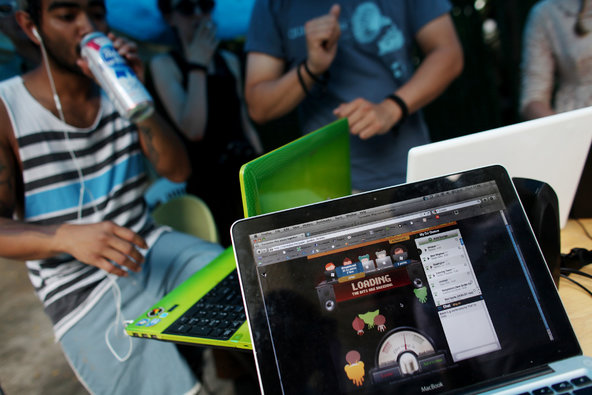 Kirsten Luce for The New York Times Turntable.fm is an online app that mimics the communal experience of listening to music together during a concert or in someone’s basement.
Kirsten Luce for The New York Times Turntable.fm is an online app that mimics the communal experience of listening to music together during a concert or in someone’s basement.
Growing up, the radio provided the soundtrack for doing my hair in the morning and the ride to school. It kept me company during late nights while I finished my homework and entertained during long summer road trips with my family.
Fast forward a few years. I got a CD player for my car and cycled through a series of portable music devices, from hand-me-down Walkmans to MiniDisc players, iPod Nanos and finally, an iPhone with Spotify. And it was great. My music life got more efficient. I could listen to exactly what I wanted, anytime, without having to suffer through annoying D.J. interludes and commercials.
But earlier this year, work sent me to Los Angeles. Sitting in my rental car in traffic, I turned on Hot 92.3 and made my way across the city, singing along to the Top 40 hits and laughing at the cheesy banter of the radio jockeys. During dinner, I bonded with a friend who had listened to the same segments on the same station that morning. It was a throwback to my teen years, hauling friends around in my Volvo station wagon. It was fun and communal in a way that streaming music hasn’t been in years.
Back in New York, I gushed to a friend about my radio revelations and he suggested I check out some of the newer radio applications. I’ve been hooked ever since.
These apps let you listen to nearly any radio station around the United States. I listen to local morning shows for their reality-show recaps, ticket giveaways and celebrity gossip; then later in the day, switch over to radio stations in California or Houston to check out what the D.J.s are throwing on in those cities to hype people up for the night out.
And as it turns out, TuneIn, the app I use the most, is actually quite popular. The company said it has more than 40 million monthly users and more than 1 billion hours listened in total through the service, which is free. In May, TuneIn raised $25 million from Institutional Venture Partners (the same firm that just funded Snapchat), Sequoia, Google and General Catalyst.
The appeal of the radio isn’t the music selection — I often hear the same annoying Drake or Taylor Swift song before I get something fresh. And the commercials are just as annoying and jarring as traditional radio.
It’s the human element that draws me in, knowing that someone is selecting songs for you. Remember Turntable? We didn’t love it because it was cutting edge or worked perfectly — we loved it because the online app mimics the communal experience of listening to music together during a concert or in someone’s basement.
That’s something that often feels missing from our digital interactions and lives. Maybe that’s why the visual vernacular of images, emoji, those cartoons text characters, and GIFs are all so popular. They’re more evocative of a mood or emotion and let you feel more of the person behind the interaction. It also might be one of the reasons podcasts still find dedicated listeners in an age where talk radio often feels so outdated.
And there’s something lovely about the way radio apps let you tune in to any station you want, instead of just whatever is within range. I like listening to KCRW and KMEL when I’m nostalgic for the Bay Area, where I lived for a few years. It’s in those moments that I’m transported back to a time or a place — a college house party or high school trips to the mall — and I’m reminded that a person, not a machine, picked it. It’s the same reason I love typos in my text messages, and often don’t mind when I misspell something on Twitter.
You can feel the humanness in those imperfections. They remind you that you aren’t alone, something that can be hard to remember when you spend so much time interacting with everyone and everything through a screen.
This post has been revised to reflect the following correction:
Correction: July 5, 2013
An earlier version of this post misstated the radio station that the writer was listening to. It is Hot 92.3, not Hot 97.
Article source: http://bits.blogs.nytimes.com/2013/07/05/digital-diary-rediscovering-radio-through-apps/?partner=rss&emc=rss